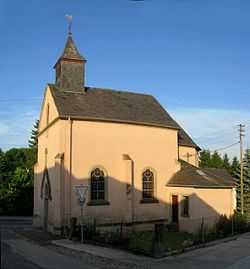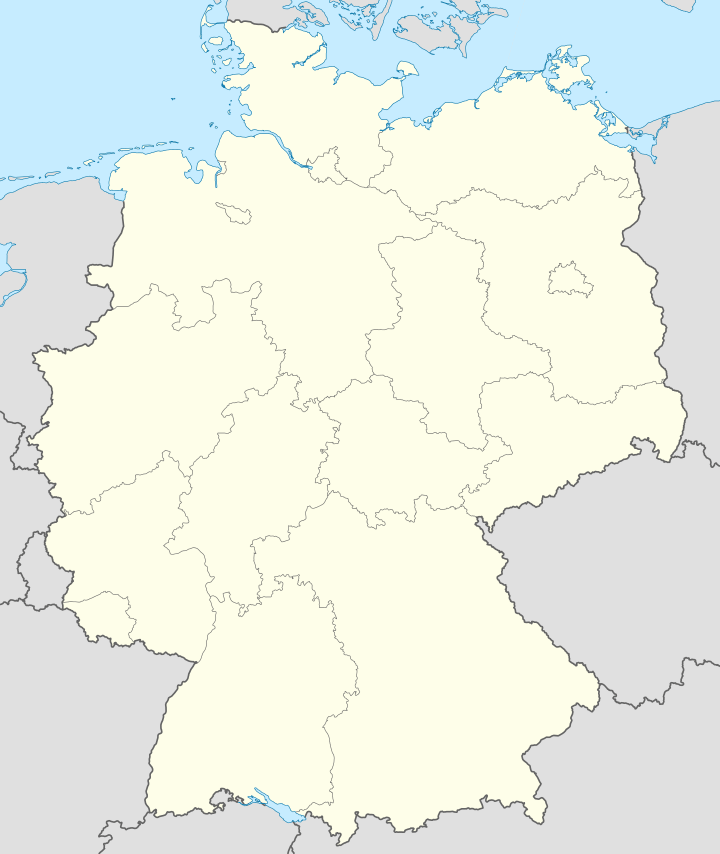Aach, Rhineland-Palatinate
| Aach | ||
|---|---|---|
 | ||
| ||
 Aach | ||
Location of Aach within Trier-Saarburg district  | ||
| Coordinates: 49°47′28″N 06°35′24″E / 49.79111°N 6.59000°ECoordinates: 49°47′28″N 06°35′24″E / 49.79111°N 6.59000°E | ||
| Country | Germany | |
| State | Rhineland-Palatinate | |
| District | Trier-Saarburg | |
| Municipal assoc. | Trier-Land | |
| Government | ||
| • Mayor | Ralf Kierspel (CDU) | |
| Area | ||
| • Total | 6.96 km2 (2.69 sq mi) | |
| Population (2012-12-31)[1] | ||
| • Total | 1,089 | |
| • Density | 160/km2 (410/sq mi) | |
| Time zone | CET/CEST (UTC+1/+2) | |
| Postal codes | 54298 | |
| Dialling codes | 0651 | |
| Vehicle registration | TR | |
| Website | www.gemeinde-aach.de | |
Aach (![]() ) is a municipality in the German state of Rhineland-Palatinate. It is part of Trier-Land, a Verbandsgemeinde.
) is a municipality in the German state of Rhineland-Palatinate. It is part of Trier-Land, a Verbandsgemeinde.
History
The settlements on Aach's ground date back to the Bronze Age. Later there also was a settlement of the Roman Empire. The current municipality was first mentioned in the year 953 under its Latin name Aquacuum. Despite being situated so close to the City of Trier it was not part of the Archbishopric of Trier. Belonging to the Benedictine monastery St. Irminen it was itself reichsfrei. This fact caused many Jews to settle down in Aach after they were expelled from Trier in the 16th century.
During the time of the Napoleonic Wars Aach was—according to the Treaty of Lunéville 1802—a part of France. After Napoleon's ultimate defeat in 1815 Aach became a part of the new Prussian Rhineland province. Prussia itself became a part of the German Empire in 1871.
Under nazi rule between 1933 and 1945 Aach's Jewish citizens were either forced to emigrate or murdered in the Nazi concentration camps. Nowadays there is no organized Jewish community in Aach anymore. The synagogue and the Jewish cemetery, however, still exist.
After World War II Aach became a part of the new (West) German state of Rhineland-Palatinate.
Aach is famous for its "Viez", the typical hard cider of the region.
Law and government
Aach has a council with sixteen seats. The elections in 2004 brought the CDU twelve seats, the other four went to the free voters' association FWG Aach e. V. In the same elections Mayor Josef Krein (CDU) was voted into office with nearly 74% of the votes. The last elections in 2009 brought the Christian Democrats all sixteen seats. Ralf Kierspel (CDU) was voted with 92,72% as mayor.
Geography
Aach lies about 6 km north of the center of Trier. It is situated in the southern Eifel mountains. Hohensonne is a village located just to the west and is included in the municipality.
Aach can be reached via Autobahn A 64 (connecting Trier and Luxembourg) at exit no. 3 about 3.7 km south of Aach. The next railway station is the central station of Trier.
References
- ↑ "Bevölkerung der Gemeinden am 31.12.2012". Statistisches Bundesamt (in German). 2013.
